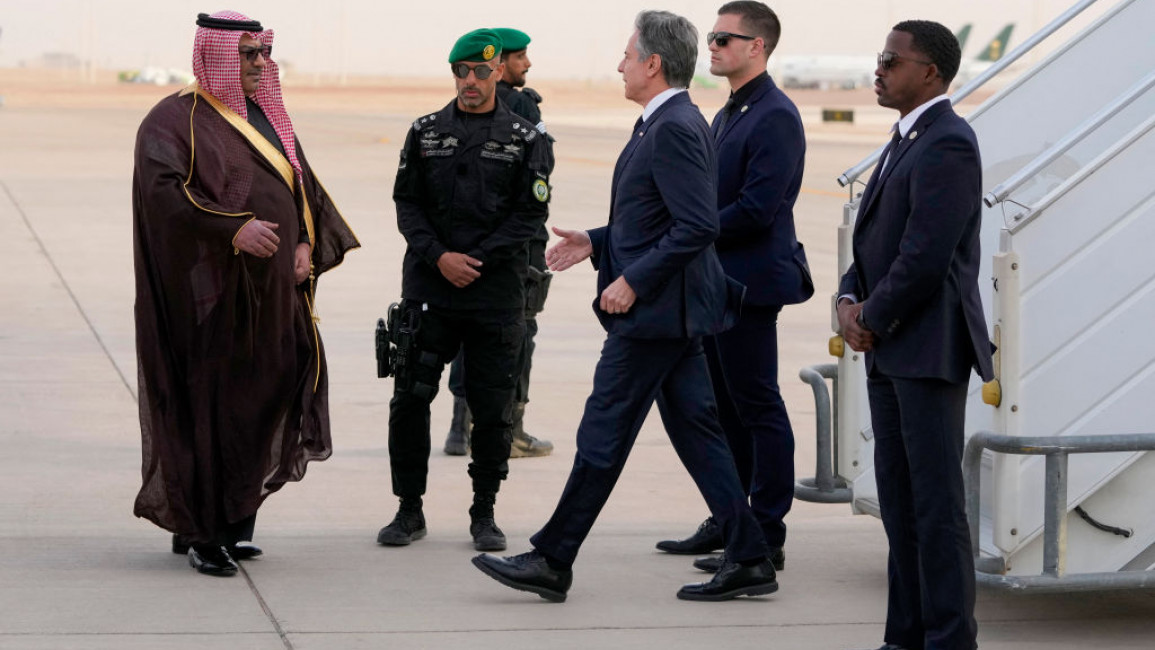Saudi Arabia rejects normalisation with Israel amid Gaza war, contradicts Biden admin claims
In a sharply worded rebuke likely to postpone any talk of expanding the Abraham Accords until after the US election, Saudi Arabia said unequivocally it will not normalise relations with Israel as desperately hoped for by the Biden administration in Washington, and would only consider it if the war in Gaza stops and an independent Palestinian state is established.
"The Kingdom has communicated its firm position to the US administration that there will be no diplomatic relations with Israel unless an independent Palestinian state is recognised on the 1967 borders with East Jerusalem as its capital," read a statement from the foreign ministry on Wednesday.
Israeli "aggression" in Gaza must also stop and all Israeli forces must withdraw from the besieged territory, the statement added.
The move appears to pour cold water on the increasingly chaotic and incoherent White House, just as US Secretary of State Antony Blinken wrapped up a visit to Riyadh where he met the kingdom's de-facto ruler Crown Prince Mohammed bin Salman, on his way to Egypt, Qatar and Israel, where he is pressing for a truce deal in the Israeli war on Gaza.
Wednesday's statement is also an explicit dressing down of White House National Security Council spokesman John Kirby, who told reporters a day earlier that talks on Saudi-Israeli normalisation were "ongoing" and that Washington had "received positive feedback from both sides that they're willing to continue to have those discussions".
A Statement from the Ministry of Foreign Affairs regarding the discussions between the Kingdom of Saudi Arabia and the United States of America on the Arab-Israeli peace process. pic.twitter.com/UBWc30iv1V
— Foreign Ministry 🇸🇦 (@KSAmofaEN) February 7, 2024
"In light of what has been attributed to the US National Security Spokesperson, the Ministry of Foreign Affairs affirms that the position of [the] Kingdom of Saudi Arabia has always been steadfast on the Palestinian issue and the necessity that the brotherly Palestinian people obtain their legitimate rights," the Foreign Ministry said.
"The Kingdom has communicated its firm position to the US administration that there will be no diplomatic relations with Israel unless an independent Palestinian state is recognized on the 1967 borders with East Jerusalem as its capital, and that the Israeli aggression on the Gaza Strip stops and all Israeli occupation forces withdraw from the Gaza Strip," it added.
"The Kingdom reiterates its call to the permanent members of the UN Security Council that have not yet recognized the Palestinian state, to expedite the recognition of the Palestinian state on the 1967 borders, with East Jerusalem as its capital, so that the Palestinian people can obtain their legitimate rights and so that a comprehensive and just peace is achieved for all".
Abraham Accords on hold?
Saudi Arabia, considered one of the most crucial Muslim nations and home to Islam's holiest site in Mecca, has never recognised Israel and did not join the 2020 US-brokered Abraham Accords that saw its Gulf neighbours Bahrain and the United Arab Emirates, as well as Morocco, establish formal ties with Israel.
On Tuesday, Blinken told reporters in Doha that Saudi Crown Prince Mohammed bin Salman had "reiterated Saudi Arabia's strong interest in pursuing" normalisation during their meeting in Riyadh.
"But he also made clear what he had said to me before, which is that in order to do that, two things will be required - an end to the conflict in Gaza, and a clear, credible timebound path to the establishment of a Palestinian state," Blinken said.
US President Joe Biden's administration has pushed hard for Saudi Arabia to recognise Israel.
Before the Gaza war broke out in October, Riyadh laid out conditions including security guarantees from Washington and help developing a civilian nuclear programme, and measures to improve conditions for Palestinians.
Any momentum stalled soon after Hamas launched an unprecedented attack on southern Israel on October 7 followed by an Israeli genocidal war on Gaza that has killed at least 27,585 people in Gaza, mostly women and children.
Saudi Arabia's ambassador to Washington, Princess Reema bint Bandar al-Saud, told the World Economic Forum last month that normalisation would be impossible without an "irrevocable" pathway towards the creation of a Palestinian state.
(With agencies)


![Minnesota Tim Walz is working to court Muslim voters. [Getty]](/sites/default/files/styles/image_684x385/public/2169747529.jpeg?h=a5f2f23a&itok=b63Wif2V)




![Debris near Rafic Hariri International Airport [Getty]](/sites/default/files/styles/image_212x120/public/2176162423.jpeg?h=a5f2f23a&itok=XLiO6WHk)
![An Israeli air strike on Jabalia killed teenage journalist Hassan Hamad [Screengrab/X]](/sites/default/files/styles/image_330x185/public/2024-10/hassan%20hamad1.jpg?h=c12e0b96&itok=Rd_dyCVp)
